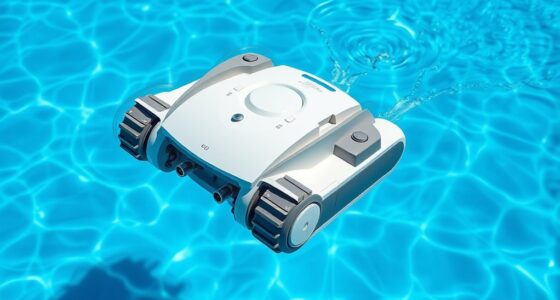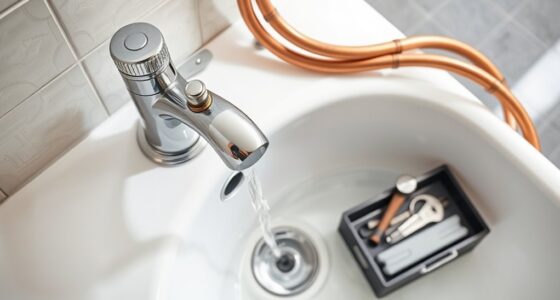To cut energy bills cost-effectively, upgrade to smart thermostats and ENERGY STAR appliances, which save energy without sacrificing performance. Practice proper maintenance, like cleaning filters and defrosting regularly. Adopt simple habits such as turning off lights, unplugging devices, and using power strips. Also, consider timing your appliance use during off-peak hours. Small adjustments and smart choices can lead to big savings—discover more ways to boost your energy efficiency below.
Key Takeaways
- Install a smart thermostat to optimize heating and cooling based on your schedule and reduce energy waste.
- Use ENERGY STAR appliances to cut electricity consumption without sacrificing performance.
- Regularly maintain appliances by cleaning filters and defrosting to keep them running efficiently.
- Turn off unused lights and unplug devices to prevent standby power drain and save energy.
- Take advantage of off-peak hours for laundry and dishwashing, and understand your utility’s rate structure to maximize savings.

Reducing your energy bills doesn’t have to be complicated or expensive. One of the simplest ways to start saving is by upgrading to smart thermostats. These devices learn your schedule and adjust the temperature accordingly, so you’re not wasting energy when you’re away or asleep. With just a few taps on your phone, you can set your home to be comfortable only when needed, which cuts down on unnecessary heating and cooling costs. Smart thermostats also provide detailed energy usage reports, helping you identify patterns and further optimize your consumption. Investing in such a device can lead to considerable savings over time, especially if you’re used to manually adjusting your thermostat or leaving it set at a constant temperature. Studies indicate that smart thermostat use can significantly reduce energy consumption and costs.
Smart thermostats save energy by learning your schedule and adjusting temperatures automatically.
Alongside smart thermostats, switching to energy efficient appliances is another effective way to reduce your energy bills. Modern appliances are designed to use less power without sacrificing performance. For example, energy-efficient refrigerators, washing machines, and dishwashers often have special features that minimize electricity and water consumption. Although they might seem like a bigger upfront investment, these appliances usually pay for themselves over time through lower utility bills. When shopping for new appliances, look for the ENERGY STAR label, which indicates that the product meets strict efficiency standards. Replacing older, outdated appliances with newer models can make a noticeable difference in your monthly expenses.
You can also maximize savings by properly maintaining your appliances. Regularly cleaning filters, defrosting refrigerators, and ensuring vents are clear can keep them running efficiently. Additionally, avoid overusing appliances or running them during peak times when electricity rates are higher. For instance, doing laundry or running the dishwasher late at night or early in the morning can save you money, especially if your utility offers time-of-use rates.
Another simple step is to be mindful of your energy habits. Turn off lights and unplug devices when they’re not in use, as they can still draw power in standby mode. Using power strips makes it easier to switch off multiple devices at once, preventing “phantom” energy drain. Small behavioral changes combined with smart technology and energy-efficient appliances can considerably lower your bills without requiring major renovations or costly upgrades. Additionally, understanding glycolic acid benefits can help improve skin health with minimal effort, contributing to overall well-being without extra expense.

Sensi Smart Thermostat, 100 Years Of Expertise, Wi-Fi, Data Privacy, Programmable, Easy DIY Install, Works With Alexa, Energy Star Certified, Mobile App, ST55
PRIVACY PROTECTION*: Sensi won’t sell your personal information to third parties
As an affiliate, we earn on qualifying purchases.
As an affiliate, we earn on qualifying purchases.
Frequently Asked Questions
Are Solar Panels Worth the Investment for Energy Savings?
Solar panels can be a smart investment if you’re looking to save on energy bills long-term. While solar panel installation costs might seem high initially, they often pay off with lower energy expenses over time. Remember, regular solar panel maintenance keeps them efficient. Consider your location, sunlight exposure, and potential incentives, as these factors influence whether solar panels are worth it for your energy savings.
How Can I Improve Home Insulation Cost-Effectively?
Did you know that poor insulation can waste up to 30% of your home’s energy? To improve it cost-effectively, start with sealing your windows to prevent drafts. Next, add attic insulation, which offers significant energy savings by maintaining indoor temperatures. These simple upgrades are affordable and easy to do, making your home more comfortable while lowering your energy bills. Don’t wait—start sealing and insulating today!
What Government Incentives Are Available for Energy-Efficient Upgrades?
You can take advantage of government incentives for energy-efficient upgrades, including tax credits that lower your costs. Many programs encourage switching to renewable energy sources like solar panels or wind turbines. Check your local and federal government websites for specific incentives available in your area. These incentives make it more affordable to invest in renewable energy and upgrade your home’s efficiency, ultimately saving you money while helping the environment.
Which Smart Home Devices Best Reduce Energy Consumption?
Imagine you install a smart thermostat in your home, like the case of Sarah, who reduced her energy use by 15%. Smart thermostats learn your schedule, optimize heating and cooling, and save you money. Pairing this with energy monitoring devices gives you real-time insights into your consumption. These smart home devices help you control energy use efficiently, making them some of the best solutions to cut down on energy consumption.
How Often Should I Service My HVAC System for Efficiency?
You should schedule HVAC maintenance at least once a year to keep your system running efficiently. Regular servicing helps identify issues early, guaranteeing peak performance and extending system longevity. During maintenance, professionals clean components, check refrigerant levels, and inspect for wear and tear. By staying consistent with HVAC maintenance, you prevent costly repairs and ensure your system operates smoothly, saving you energy and money over time.

Kenmore 30" Top Mount Refrigerator with Freezer – Adjustable Shelving, Humidity-Controlled Crispers, LED Lighting, ENERGY STAR Certified, Garage Ready, 18.1 cu. ft. Capacity – White
Spacious Yet Compact: This 30-inch, white refrigerator offers 18.1 cu. ft. of standard-depth storage space, giving you plenty…
As an affiliate, we earn on qualifying purchases.
As an affiliate, we earn on qualifying purchases.
Conclusion
By implementing these cost-effective tips, you’re planting seeds for a more energy-efficient future. Think of your home as a finely tuned orchestra—each small adjustment adds harmony and saves you money. Don’t wait for the storm to hit; take proactive steps now to shield yourself from soaring energy bills. With consistent effort, you’ll turn your home into a well-oiled machine, where savings flow smoothly and effortlessly, making your wallet and the planet both happier.

BLACK+DECKER 4.5 Cu. Ft. Front Load Washer, Full Size Washing Machine with 12 Cycles, ENERGY STAR certified Washer Machine, Hot & Cold Inlet Hoses, LED Display, 120V, BFLW45M, White
Spacious Capacity: The 4.5 cu. ft. capacity of this washer machine provides ample space for large laundry loads,…
As an affiliate, we earn on qualifying purchases.
As an affiliate, we earn on qualifying purchases.

Power Strip Surge Protector – One Beat 6 Widely Outlets with 4 USB Ports (2 USB C), 5 Ft Extension Cord Flat Plug, Wall Mount Outlet Extender Small Power Strip for Travel Home Office College Dorm Room
【10-IN-1 Desktop Power Strip with USB C Fast Charge】— With 6 AC outlets, 2 USB ports and 2…
As an affiliate, we earn on qualifying purchases.
As an affiliate, we earn on qualifying purchases.









